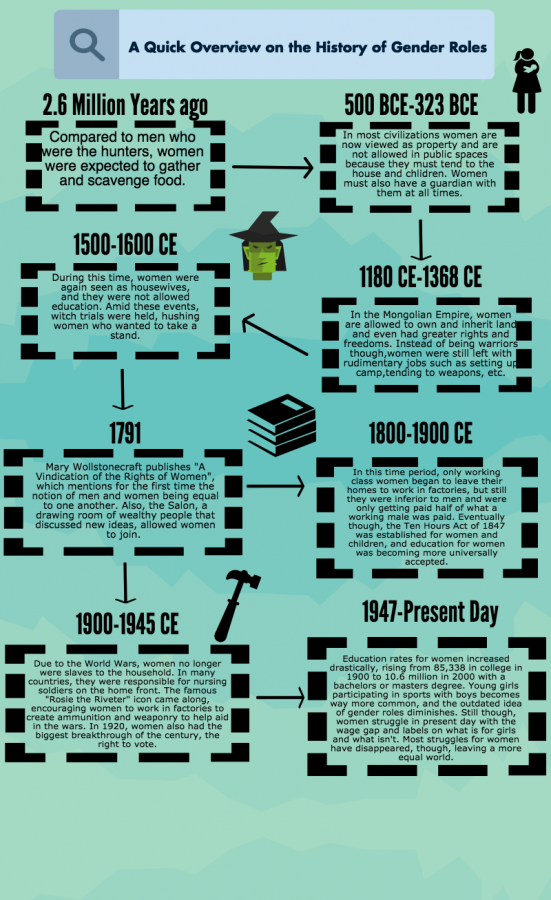Your donation will support the student journalists of North Cobb High School. Your contribution will allow us to purchase equipment and cover our annual website hosting costs.
Girls just wanna have fun (damental rights)
December 21, 2016
From the beginning of childhood, gender roles run people’s lives. The stereotypical idea that only “girls can wear pink” or that “boys can only play with toy monster trucks” surrounds children in their daily lives at school and at home.
Most parents expose their young children to gender roles shortly after birth; mothers’ receive presents before the birth of their child, which typically showcase a specific color to match the infant’s gender: pink for girls, blue for boys, and yellow for both genders. Most of a child’s brain development occurs during the first five years of their lives; with that said, gender roles established by simple ideas like the color of their clothes or what toys they can play with impact how a child’s brain develops its opinions of their peers.
A young girl cannot play football with her peers because “she’s a girl,” or a young boy cannot play with dolls because “he’s a boy.” The development of gender roles in a child’s mind continues throughout most of their elementary school years, and during recess, girls and boys typically play separately.
According to KidsHealth, young children usually play a sport by the age of six; however, categorizing sports, like wrestling, football, and baseball, as male or female affects the way children treat their peers and alters the way people think into adulthood. However, a handful of young girls choose to go against the status quo and participate in these sports.
Tess Williams, a sophomore at NC, has participated in NC’s junior wrestling team and high school wrestling program for almost six years. This year she began managing for the team. Over the years, she enjoyed learning different wrestling techniques and defying the expectations of a young girl.
Williams entered the world of a “boy sport” not knowing what to expect, but to her surprise, keeping up with the rest of the team and dealing with her teammates’ attitudes towards her never shattered her will to keep up.
“The [wrestling boys] were never rude; they kinda went easy until I showed them what I could do, then I was just one of them,” Williams said.
Williams used the advantage of her gender to show her teammates that a difference in chromosomes should not determine her success on the team or in life. The change in atmosphere that Williams brought to her team allowed her to continue wrestling.
“I enjoyed it! It was fun and awesome to see all the boys and coaches tell the boys they got beat by a girl because middle school boys have a big ego, and it was kind of a reality check,” Williams said.
In today’s society, sports control the lives of a number of young children and their families. The influences from their peers and parents about what each gender can do skews their focus off of enjoying the sport. Young children possess more of a susceptibility to an older figure altering their opinions, and this endangers healthy brain development.
The Georgia Division of Family and Children Services states that “negative experiences can damage brain development by slowing synaptogenesis, pruning, and myelination.” Synaptogenesis, pruning, and myelination control vital processes in the brain during child development, and if tampered with, make connections and opinions based on experiences more difficult when the child matures into an adult.
Gender roles not only impact the lives of children, but they also influence how people act in their adult lives. For centuries, they determined a woman’s place in society, and only up until the women’s rights movement in the 1960s, women remained housewives and rarely attended college. The notion of marrying early, starting a family quickly, and committing their lives to their children and home, began dissipating. Limited job offerings, like nursing, teaching, and secretary work, angered women; the women’s rights movement swore to change the indifferences that women face daily.
Originally, the movement strived for equal opportunity in the workplace, but over time, it became so much more than that. Women wanted equal rights not just in the workplace, but elsewhere in society.
The National Organization for Women (NOW) fought to break the patriarchal society that generations up until that time followed, a challenging task in and of itself. Personal problems began to connect with women’s political issues, and this became an important ideal during the movement.
Politics affects people’s views on birth control, abortion, and sexuality, and society objectifying women for their perception of these matters takes away from the mentality that they can make decisions without another person’s input. Today, NOW continues to improve upon women’s status through education, litigation, and advocacy to form an equal society.
In comparison to the treatment of women in the twentieth and twenty-first century, attitudes toward gender roles and related topics changed drastically. Twenty-first century women receive opportunities in the workplace through science and engineering occupations, joining the military, and more; negative opinions on abortion, birth control, and sexuality still linger in society, but pessimistic mindsets cease to threaten women. Equality between men and women remains prominent in the 21st century, and the fight for women’s rights continues to spread around the world.

